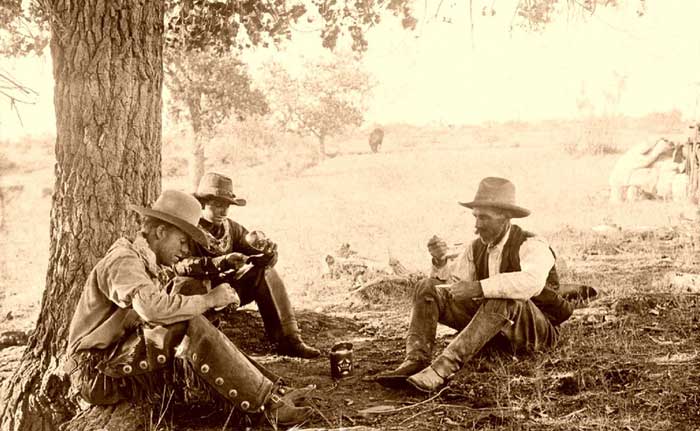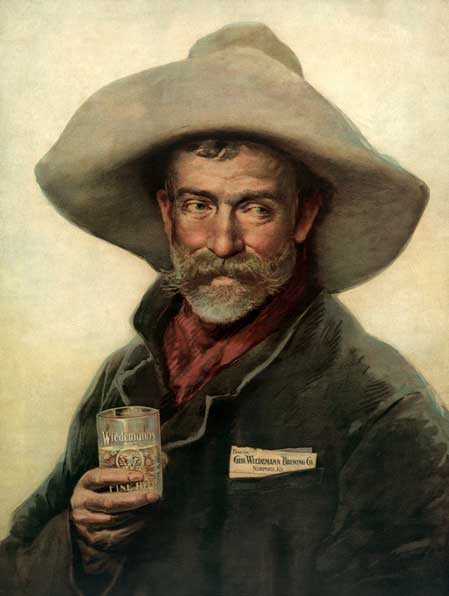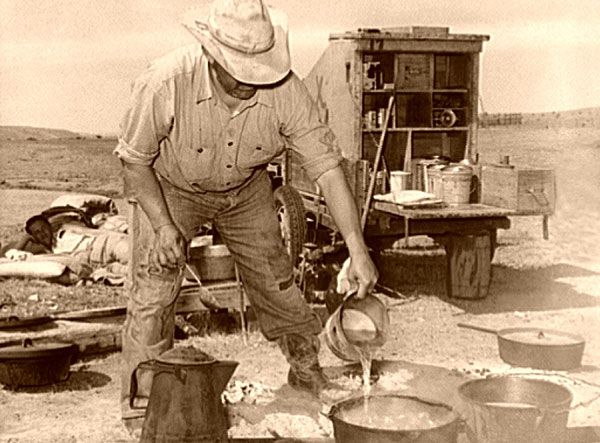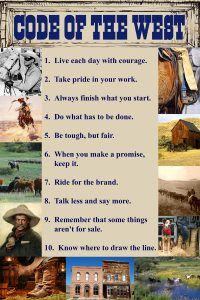“A man’s got to have a code, a creed to live by, no matter his job.” — John Wayne.
First chronicled by the famous Western writer Zane Grey in his 1934 novel The Code of the West, no “written” code existed. However, the hardy pioneers who lived in the West were bound by these unwritten rules centered on hospitality, fair play, loyalty, and respect for the land.
Ramon Adams, a Western historian, explained it best in his 1969 book, The Cowman and His Code of Ethics, saying, in part:
“Back when the cowman with his herds made a new frontier, there was no law on the range. The lack of written law made it necessary for him to frame some of his own, thus developing a rule of behavior known as the “Code of the West.” These homespun laws, merely a gentleman’s agreement to specific rules of conduct for survival, were never written into statutes but were respected everywhere on the range.
Though the cowman might break every law of the territory, state, and federal government, he took pride in upholding his unwritten code. His failure to abide by it did not bring formal punishment, but the man who broke it became, more or less, a social outcast. His friends’ hazed him into the cutbacks’, and he was subject to the punishment of the very code he had broken.”
Though the Code of the West was always unwritten, here is a “loose” list of some of the guidelines:
Don’t inquire into a person’s past. Take the measure of a man for what he is today.
Never steal another man’s horse. A horse thief pays with his life.
Defend yourself whenever necessary.
Look out for your own.
Remove your guns before sitting at the dining table.
Never order anything weaker than whiskey.
Don’t make a threat without expecting dire consequences.
Never pass anyone on the trail without saying “Howdy.”
When approaching someone from behind, give a loud greeting before you get within shooting range.
Don’t wave at a man on a horse, as it might spook the horse. A nod is the proper greeting.
Don’t look back at him after you pass someone on the trail. It implies you don’t trust him.
Riding another man’s horse without permission is nearly as bad as making love to his wife. Never even bother another man’s horse.
Always fill your whiskey glass to the brim.
A cowboy doesn’t talk much; he saves his breath for breathing.
No matter how weary and hungry you are after a long day in the saddle, always tend to your horse’s needs before your own, and get your horse some feed before you eat.
Cuss all you want, but only around men, horses, and cows.
Complain about the cooking, and you become the cook.
Always drink your whiskey with your gun hand to show your friendly intentions.
Do not practice ingratitude.
A cowboy is pleasant even when out of sorts. Complaining is what quitters do, and cowboys hate quitters.
Always be courageous. Cowards aren’t tolerated in any outfit worth its salt.
A cowboy always helps someone in need, even a stranger or an enemy.
Never try on another man’s hat.
Be hospitable to strangers. Anyone who wanders in, including an enemy, is welcome at the dinner table. The same was true for riders who joined cowboys on the range.
Give your enemy a fighting chance.
Never wake another man by shaking or touching him, as he might wake suddenly and shoot you.
Real cowboys are modest. A braggart who is “all gurgle and no guts” is not tolerated.
Be there for a friend when he needs you.
Drinking on duty is grounds for instant dismissal and blacklisting.
A cowboy is loyal to his “brand,” his friends, and those he rides with.
Never shoot an unarmed or unwarned enemy. This was also known as “the rattlesnake code”: always warn before you strike. However, if a man was being stalked, this could be ignored.
Never shoot a woman, no matter what.
Consideration for others is central to the code, such as: Don’t stir up dust around the chuckwagon, don’t wake up the wrong man for herd duty, etc.
Respect the land and the environment by not smoking in hazardous fire areas or disfiguring rocks, trees, or other natural areas.
Honesty is absolute – your word is your bond, and a handshake is more binding than a contract.
Live by the Golden Rule.
“The Code of the West was a gentleman’s agreement to specific rules of conduct. It was never written into the statutes but was respected everywhere on the range. ”
— Ramon F. Adams
Compiled and edited by Kathy Alexander/Legends of America, updated July 2023.
Also See:




